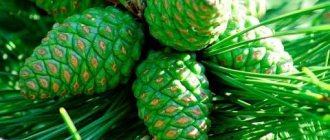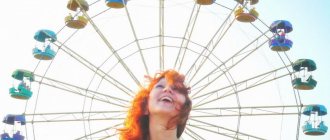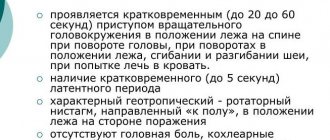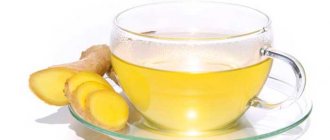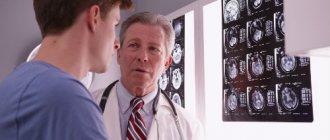Classification
Currently, it is customary to distinguish two groups into which dizziness is divided.
- Central vertigo - occurs with diseases of the brain and disturbances in its functioning.
- Peripheral - they talk about it when the inner ear and vestibular nerve are irritated, or there are signs of their damage.
A separate group includes systemic and non-systemic ones, i.e. physiological dizziness.
When the functioning of a person’s vestibular, visual and muscular systems is disrupted, they speak of systemic vertigo. This condition requires very careful diagnosis and comprehensive treatment.
Non-systemic dizziness has completely different causes - neurogenic. This can be stress, a lack of glucose in the blood, which is caused by fasting or poor diet, and overwork. Children begin to feel dizzy due to long rides on carousels; many people experience bouts of dizziness due to motion sickness on public or sea transport. This condition does not have any serious causes, and soon everything goes away.
Well, those people whose attacks of vertigo occur against the background of any diseases need to undergo a special examination to clarify the true cause.
Anatomy and mechanism of development of pathology
With dizziness, there is a growing lack of coordination of movements and balance. To find out its cause, one must understand how the transmission of nerve impulses that play a role in proprioception occurs. This term refers to a person’s ability to identify and sense the position of parts of his own body relative to each other and objects in the environment. Information is perceived by proprioceptor organs, including muscle tissue, and then moves along peripheral nerves to the spinal cord, from where it enters the brain. The necessary picture is formed in the parietal lobe of the brain after nerve impulses pass through the thalamus.
The inner ear is an organ that is responsible for a person's ability to maintain balance. It has a complex structure and consists of several sections: the vestibule, 3 semicircular canals and the cochlea. The inner ear is protected by bone tissue that forms the temporal lobe of the skull. It is filled with aqueous fluid - it moves when a person tilts and turns his head, and this information is perceived by sensitive cells to identify the position of the body in space.
The nervous system collects information that comes from the visual apparatus, tactile receptors and other sensory organs, as well as from the inner ear, and then analyzes it. The center of balance is located in the cerebral cortex, namely in its temporal region. Along the nerves, impulses reach the vestibular nuclei - clusters of nerve cells capable of perceiving, analyzing and coordinating information received from different areas.
Dizziness is a disturbance in the sense of balance. Anatomically, it can occur at several levels:
- peripheral - in case of disturbance of impulse conduction at the level of the vestibular nerve or inner ear (organ of balance);
- intermediate - the pathological process is localized at the stage of transmitting information from the inner ear to the central nervous system;
- central - associated with diseases of the brain, in which it is unable to analyze the information received.
Clinical signs of dizziness of different origins do not differ. The patient experiences a feeling of disorientation in space and abnormal movement of environmental objects. However, short-term loss of balance cannot be a consequence of serious diseases of the cerebral cortex. Such dizziness is accompanied by a number of additional symptoms and occurs after injury or certain diseases. To diagnose the cause and mechanism of development of this symptom, doctors at the Clinical Institute of the Brain carry out a comprehensive examination to determine accompanying symptoms.
Types of dizziness in various diseases
If dizziness is caused by a disease, then it will be accompanied by corresponding symptoms of a particular disease. Now let's look at the characteristic signs of some diseases that can cause vertigo attacks in a person.
Diseases of the inner ear and inflammatory processes in it. Here, in addition to dizziness, the patient will have specific discharge from the ears and reduced hearing sensitivity. The formation of wax plugs in the ear canals is also one of the causes of dizziness.
If a person has Meniere's disease, attacks of dizziness are quite severe and frequent. In addition, other symptoms are observed: hearing deteriorates, noise in the ear occurs, vomiting or nausea appears.
With vestibular neuritis, dizziness usually worsens if a person stands up suddenly or turns his head.
Brain hemorrhage or stroke. One of the most dangerous causes of dizziness. A person’s head begins to spin suddenly, and this state lasts for quite a long time. Along with an attack of vertigo, weakness appears, speech is impaired, there is no sensitivity in the muscles, coordination and vision are impaired.
Dizziness with cervical osteochondrosis is characterized by intensification when moving the head. Unsteady gait, loss of orientation, and pain in the neck may also occur.
This source of dizziness, such as the formation of a tumor in the brain, is characterized by gradually increasing attacks of vertigo, with severe headaches and the development of one-sided deafness.
Constant tinnitus, dizziness and sudden hearing loss on one side are symptoms of a perilymphatic fistula.
Weakness and nausea, coupled with dizziness, occur after spinal injury and traumatic brain injury.
If attacks of dizziness are aggravated by the fact that a person has changed the position of the body, then we are talking about benign positional vertigo.
Basilar migraine - the head begins to spin long before the attack of the migraine itself, neurological symptoms are also present: nausea, darkening of the eyes, tinnitus, vomiting.
Some medications may cause dizziness as a side effect. Goes away after discontinuation of the drug.
Let's sum it up
Staying on your feet isn't just important socially. This statement primarily implies human health. For this purpose, nature endowed him with balance. Many factors can lead to malfunction of the vestibular system. They influence directly and indirectly. The result is often dizziness. If such a disorder occurs, it is recommended to consult a doctor. Once the cause of the disorder is determined, therapy can begin. Today, treatment with folk remedies is increasingly being combined with options from traditional medicine.
Dizziness during menstruation and menopause
Women have their own reasons for dizziness. They are associated with hormonal changes in the body during PMS, menopause or pregnancy. The rapid loss of hemoglobin by the female body during menstrual periods often leads to anemia and lack of oxygen in the brain. It is these reasons that lead to dizziness, depression, and sudden changes in mood. With the advent of menopause, a woman’s body undergoes serious changes, which are accompanied by pressure surges and increased excitability of the autonomic nervous system.
How to cope with weather dependence
THERE IS NO BAD WEATHER
A sharp change in weather affects our well-being. Weakness, headache, aching joints are the most common complaints of weather-sensitive people. What are the vagaries of nature and how to cope with them?
"Disease of Civilization"
This is called weather dependence. We have accustomed ourselves to comfort: in the summer - air conditioning, in the winter - heating, walking has lost out to travel by transport, and an evening watching TV has replaced active recreation. A person's adaptation mechanisms weaken. As a result, he reacts to weather changes with poor health, a decrease or increase in blood pressure, irritability, and insomnia.
Who is suffering?
Stress-prone office workers, the elderly and weakened by chronic diseases suffer from weather fluctuations; those at risk are those who eat fatty, heavy foods, drink a lot of coffee and move little.
Dangerous symptom
Sometimes weather dependence is a sign of heart and cardiovascular diseases, thyroid diseases, and iron deficiency (anemia). In this case, you need to be examined and take medications prescribed by your doctor.
How to tame the storm?
The main prevention of weather dependence is a healthy lifestyle: good sleep, a balanced diet, a lot of exercise, additional sources of vitamin E and omega acids.
What to eat in bad weather? It is recommended to increase the proportion of foods rich in potassium, magnesium, calcium - potatoes, bananas, eggplants, cabbage, apricots, dried fruits, spinach, nuts. The diet of fresh foods consumed raw should be at least 60%. Elderly people and those suffering from chronic diseases should additionally take sources of these substances.
We train the blood vessels Good results are achieved by such simple vascular training as contrasting baths for hands and feet, baths with sea salt. If your health allows, you can do interval training, for example, a few squats, then a break. Hiking and Nordic walking will improve blood circulation, strengthen muscles and the nervous system.
Natural adaptogens This is a group of drugs of natural or artificial origin that can increase the body's resistance. Natural remedies include ginseng, leuzea, lemongrass, eleutherococcus, and rhodiola . Elderly people are recommended to take medications based on ginkgo biloba extract, glycine . They improve cerebral circulation and accelerate metabolism in brain cells, which increases the supply of glucose and oxygen to the brain.* *The article is for informational purposes only. Before using medications, you should consult a doctor.
First aid
In case of severe attacks of dizziness, the victim must be given first aid. A person should take a horizontal position, take a few drops (8-10) of atropine 0.1% solution. And, of course, do not forget about ensuring the flow of fresh air. In some cases, it may be necessary to relieve nervous tension with sedatives or tranquilizers.
Further assistance should be provided by a doctor. Only a specialist can identify the cause of dizziness and prescribe effective treatment. It is quite possible that to find out a more complete picture of the disease and an accurate diagnosis, you will need to consult different doctors: a therapist, a neurologist, an endocrinologist, an otolaryngologist.
Herbal infusions
Herbal infusions are highly effective for vertigo. They allow you to completely get rid of it or significantly alleviate a person’s condition.
Melissa is most often used in recipes. To prepare the decoction, you will need to pour a tablespoon of dry leaves into a glass of boiling water and cool. It can then be taken as tea.
Oregano is no less useful for dizziness. You need to brew 2 tablespoons of the dry mixture in a thermos, leaving for 12 hours. After this, the healing decoction should be drunk a day, dividing it into four equal portions. The duration of treatment is no more than 3 weeks.
For mild ailments, the following infusion is also very useful. To prepare it, you will need to mix 100 g of mint leaves, linden flowers and peony root. Then add a tablespoon of the resulting raw material to a glass of boiling water and let it brew. Traditional healers recommend taking the decoction throughout the next day. The indicated amount of raw materials is designed for a full course of therapy.
Treatment with folk remedies
Fans of alternative medicine and folk remedies have their own recipes for relieving attacks of dizziness. The following are considered effective in these cases: ginger tea, carrot, beet and pomegranate juices. Drinking small portions of parsley seed tea throughout the day will stop the attack. Tea is brewed at the rate of 1 teaspoon of seeds per glass of boiling water and infused for 6-8 hours. Mint, lemon balm, linden blossom - teas made from these medicinal plants also have a positive effect in the treatment of dizziness.
Attacks of dizziness, as such, do not pose any threat to human life. However, in some cases they can indicate serious illnesses. And therefore, if, along with dizziness, symptoms such as severe headache, loss of sensation in the limbs, incoherent speech, and confusion are observed, you should urgently call an ambulance.
Primary appointment with a neurologist: 1850 RUR.
Sign up Online 5% discount when registering from the site
What does alternative medicine offer for dizziness?
This condition has happened to everyone at least once in their life. Both an adult and a child can feel at any moment how the ground disappears from under their feet, and surrounding objects begin to rotate faster and faster, causing nausea, weakness, the appearance of “spots” in the eyes and poorly controlled swaying of the body from side to side.
Dizziness can occur for many reasons. Head injuries, pregnancy, atherosclerosis, age-related changes, benign and malignant formations, dysfunction of the nervous system, stress in the end - all this provokes vestibular disorder.
Without detracting from the advantages of drug therapy, we will discuss folk remedies that are often recommended by doctors themselves as an addition to the treatment regimen.
Single-component drugs
How can they treat the disease?
Inhaling the smell of chopped onions (2-3 minutes) will help to quickly relieve an attack of dizziness.- Seaweed contains a large amount of iron and iodine, so people suffering from frequent dizziness need to eat it more often - preferably every day, 300-400 grams.
Doctors strongly advise limiting or completely eliminating tea, coffee and carbonated drinks from the diet if the patient suffers from frequent dizziness. It is better to give preference to herbal decoctions: brew linden blossom, mint, lemon balm, hawthorn.
Expert opinion
Zemlyanukhina Tatyana Vyacheslavovna
Ambulance and emergency paramedic at the Clinical Emergency Hospital #7 in Volgograd.
Ask an expert
If you decide to use the presented folk remedies, then you should be careful. This is especially true for inhaling the smell of onions, since if you have breathing problems (for example, asthma), such a procedure can trigger an attack.
Juice treatment
- Squeeze the juice from fresh lemon and apply a few drops to your temples - this will help restore coordination and relieve lightheadedness.
- A mixture of beetroot and cranberry juice helps strengthen the walls of blood vessels: drink half a glass once a day.
Tinctures
- Pour half a glass of boiling water over a teaspoon of red clover inflorescences, leave to steep for 2-3 hours, covered, and cool. Take 50 ml half an hour before meals 2 times a day. The course of treatment is 2 weeks.
- Sage tea will help improve your overall well-being and calm your nerves. A handful of inflorescences are poured with hot water and the infusion is drunk half an hour before meals.
- Elecampane root is ground into powder, a pinch is poured with boiling water (200 ml) and filtered after 30 minutes. Take 3-4 times a day. Elecampane relieves fatigue and improves the functioning of the vestibular apparatus.
- Parsley seeds are also used as a folk remedy for dizziness. For 1 spoon of raw material, take a glass of boiling water, brew and leave for 8 hours. Strain, take 50 ml before meals. The course of treatment is a week.
- Chestnut tincture is especially helpful for women suffering from dizziness during menopause. Pour 2 large spoons of fresh buds into 500 ml of Cahors (70 degrees), heat in a water bath, cool. You can sweeten the tincture with honey. You are allowed to take 50 ml of the product per day according to the following scheme: drink for a week, rest for a week.
Oils
Essential oils have a tonic and invigorating effect . They can be used for massage, added to a bath or aroma lamp.
- Drop a little peppermint oil on a handkerchief and inhale its aroma if you feel sick in transport. To massage the neck and head, add 2 drops of lemon, rosemary and mint oil to a spoon of base (olive or almond).
- Mix essential oils of juniper, fir and camphor in a ratio of 1:3:10 and rub the resulting mixture into the back of the head, temples and lymph nodes. It will help quickly relieve discomfort. Lavender oil will have the same effect.
- You can take a course of inhalations with cinnamon oil: add 2-3 drops of oil to 0.5 liters of hot water and breathe over the vessel for 5-7 minutes. Give 7 inhalations every other day. Such inhalations are contraindicated for children and pregnant women.
Herbal medicine, oils and other components do not help immediately - the course of treatment should last at least two weeks. Prepare the medicine strictly according to the prescription, maintaining all dosages.
